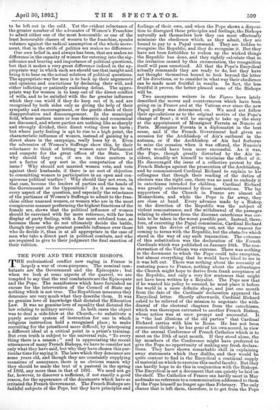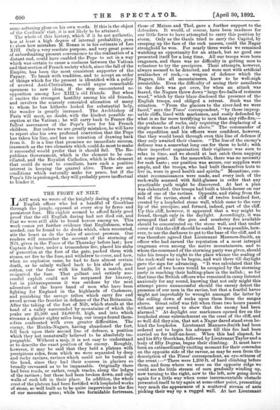THE POPE AND THE FRENCH BISHOPS. T HE ecclesiastical conflict now
raging in France is largely a war of cross-purposes. The nominal com- batants are the Government and the Episcopate ; but when we look at some aspects of the quarrel, we are tempted to say that the real combatants are the Episcopate and the Pope. The manifestoes which have furnished an excuse for the intervention of the Council of State say nothing which is not true. The Republican measures they denounce are very much what they describe them. It was no genuine love of knowledge that dictated the Education Law. It was no genuine love of equality that dictated the law relating to military service. In both cases the object was to deal a side-blow at the Church,—to substitute a purely secular system of instruction for one in which religious instruction held a recognised place ; to make recruiting for the priesthood more difficult, by interposing a different ideal at a critical point in a priest's training. But even truth is subject to the universal rule, " To every thing there is a season ; " and in appreciating the recent utterances of many French Bishops, we have to consider not only what they have said, but why they have chosen this par- ticular time for saying it. The laws which they denounce are some years old, and though they are constantly supplying occasions of annoyance, there is no obvious reason why they should be made the text of a pastoral in the spring of 1892, any more than in that of 1891. We need not go far, however, to discover a sufficient, if not exactly a good reason, for the appearance of the documents which have so irritated the French Government. The French Bishops are faithful subjects of the Pope, but they have principles and feelings of their own, and when the Pope shows a disposi- tion to disregard these principles and feelings, the Bishops naturally ask themselves how they can most effectually minimise the obedience which, as they admit, they are bound to pay to a Papal command. They are bidden to recognise the Republic, and they do recognise it. But they have not been forbidden to reckon up the wicked things the Republic has done, and they rightly calculate that in the irritation caused by this enumeration, the recognition itself will pass unnoticed. All that the Pope's Encyclical actually commands they are ready to do, but they have not thought themselves bound to look beyond the letter of his directions, or to consider in what way their obedience can be made most fruitful in results. In fact, the less fruitful it proves, the better pleased some of the Bishops will be.
Two anonymous writers in the Figaro have lately described the moves and countermoves which have been going on in France and at the Vatican ever since the new Papal policy was determined on. We need not follow their speculations as to the original motive of the Pope's change of front ; it will be enough to take up the story at the appointment of Monsignor Ferrata as N uncio at Paris. Monsignor Ferrata is a diplomatist in the best sense, and if the French Government hud given no occasion for the Archbishop of Aix's outburst in the autumn, or if the Archbishop of Aix had forborne to seize the occasion when it was offered, the Nuncio's efforts would have been more successful. As it was, the Pope, though greatly disturbed by the Aix in- cident, steadily set himself to minimise the effect of it.
He discouraged the issue of a collective protest by the French Bishops against the prosecution of the Archbishop, and he commissioned Cardinal Richard to explain to his colleagues that though their reading of the duties of electors was the right one, there was no need to embody it in catechisms intended for children. Cardinal Richard was greatly embarrassed by these instructions. The lay supporters of the Church in France are almost all Monarchists, and while the Pope is far away, they are close at hand. Every advance made by a Bishop in the direction of the Republic was the subject of violent remonstrance, and the withdrawal of the passages relating to elections from the diocesan catechisms was cer- tain to be taken in the worst possible part. Instead, there- fore, of executing the Papal commission, Cardinal Richard hit upon the device of setting out, not the reasons for coming to terms with the Republic, but the obstacles which stand in the way of any such transaction. The outcome of this substitution was the declaration of the French Cardinals which was published on January 16th. The con- sternation of the Vatican was extreme. There was nothing in the document to which the Pope could take exception, but almost everything that he would have liked to see in it was left out. There was nothing about the necessity of restoring peace to France, nothing about the advantages the Church might hope to derive from frank acceptance of the Republic, and only a very few sentences that might not have been written by a Royalist. The Pope saw that if he wanted his policy to succeed, he must place it before the world in a more definite shape, and just one month from the date of the Cardinals' declaration appeared the Encyclical letter. Shortly afterwards, Cardinal Richard asked to be relieved of the mission to negotiate the with- drawal of the electoral chapters from the catechisms, which was thereupon entrusted to another French Bishop, whose action was at once prompt and successful. It is "the last illusions of the old parties" that Cardinal Richard carries with him to Rome. He has not been summoned thither ; he has gone of his own accord, in view of the annual Conference of French Catholics which is to meet on the 10th of next month. If they stood alone, the lay members of the Conference might have preferred to give the Pope no opportunity of making any fresh declara- tions. They have shown remarkable skill in explaining away statements which they dislike, and they would be quite content to find in the Encyclical a continual supply of material on which to exercise this useful faculty. But they can hardly hope to do this in conjunction with the Bishops. -The Encyclical is not a document that can quietly be laid on the shelf. The Catholics of France can hardly meet in May andmake no reference to a communication addressed to them by the Pope himself no longer ago than February. The only chance that is left them, therefore, is to get from the Pope some softening gloss on his own words. If this is the object of the Cardinals' visit, it is not likely to be attained. The whole of this history, which if it be not authentic, his at least a high degree of internal probability, goes to show how mistaken M. Renan is in his estimate of Leo XIII. Only a very resolute purpose, and very great power of subordinating present convenience to the realisation of a distant end, could have enabled the Pope to act in a way which was certain to cause a coolness between the Vatican and that section of French society which, since the fall of the Empire, has been the most consistent supporter of the Papacy. To break with tradition, and to accept an order of things which for the present is identified with a policy of avowed Anti-Clericalism, would argue remarkable openness to new ideas, if the step encountered no opposition among Leo XIII.'s old friends. But when it excites the strongest hostility among his old friends, and involves the scarcely concealed alienation of many to whom he has hitherto looked for substantial help, the wonder is greatly increased. The Archbishop of Paris will meet, no doubt, with the kindest possible re- ception at the Vatican ; he will carry back to France the fullest assurances of the Pope's love for his French children. But unless we are greatly mistaken, he will have to report also his own profound conviction that the Pope has taken his line, and has no intention of drawing back from it. It is a line that promises no immediate success, inasmuch as the two elements which could do most to make it successful would prefer that it should fail. The Re- publican Government, which is the element to be con- ciliated, and the Royalist Catholics, which is the element that could do most to conciliate, have each a positive interest in keeping the quarrel alive. These are not conditions which naturally make for peace, but if the Pope's life is prolonged, they will probably prove ineffectual to hinder it.



















































 Previous page
Previous page